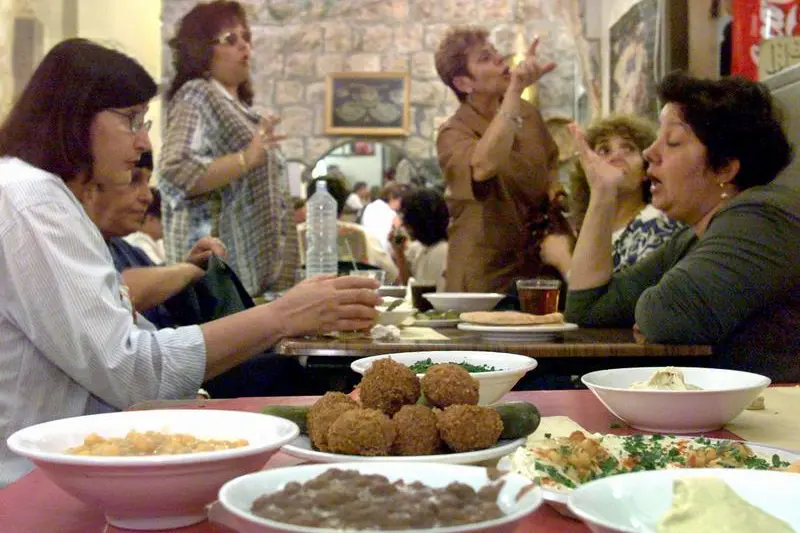PHOTO
BEIRUT: Lebanon’s newest crisis has nothing to do with politics, but concerns one of the country’s most treasured dishes: hummus. A shortage of chickpeas – the primary ingredient for hummus – has rocked the world, and Lebanon has not been spared.
Unseasonably wet and cold weather linked to climate change in chickpea-producing countries has ruined the majority of crops.
The pulse is usually planted late March to early April, timed with the warmth of spring, as chickpeas flourish in dry weather.
In parallel to the short supply, demand for chickpeas has soared.
While hummus has long been a staple food in Middle East cuisine, the popularity of the dish in the West has been rising rapidly.
Rich in nutrients and protein, it became a popular snack among vegetarians and vegans.
The two factors – damaged crops and a higher demand – have caused hummus prices to skyrocket.
Lebanon imports almost 95 percent of its chickpeas, according to the Agriculture Ministry.
However, it did not specify which countries serve as exporters.
Jabra and Sons, a Lebanese company that operates in the sales, distribution, and marketing of a wide range of food products, imports primarily from Mexico.
“The beans are planted in February and March in Mexico,” Ibrahim Jabra, the general manager, told The Daily Star. “But the frost last year killed them.”
“Canadian chickpeas are cheaper but have a different quality, size, and taste. Turkey has the best, but most expensive ones.”
Jabra added that India is the largest producer of chickpeas, but the beans are black, making them unlikely to be imported to Lebanon.
“Think about the presentation, no restaurant will serve black hummus.”
Antoine Hayek from the Agriculture Ministry told The Daily Star that while Lebanon has the ideal temperature and environment to plant chickpeas, importing them is still cheaper.
“But if the price rises a lot, we might start producing more in Lebanon,” he said.
The Lebanese market has already been affected by the shortage.
Food importer Riachi Trading said that 1 kilogram of chickpeas cost $1.50 in 2017. Now the price has nearly doubled to $2.80.
This increase is reflected on the supermarket shelves, said Fadi Fakhouri, of Riachi Trading.
“One kilogram of chickpeas is sold for LL5,000 ($3.30) when it used to be between LL1,250 ($0.99) to LL2,000 ($1.32).”
Jabra and Sons import chickpeas and sell them wholesale to companies that package for sale on the Lebanese market.
“We are now selling 1 kilogram of chickpeas at $2.60,” Jabra said.
Lebanese restaurants have also felt the rising prices, but some proprietors said they didn’t realize the traditional dish was in danger.
“We thought the increase was due to the increase in the VAT [from 10 to 11 percent],” said Charbel Bassil, head chef at the family-run Le Chef restaurant in Gemmayzeh.
He added that everything seems to get more expensive in Lebanon, so he didn’t pay much attention to the higher price of hummus.
“But I never heard of the shortage; you would think people would be talking more about it.”
When asked if the restaurant will increase the price of a plate of hummus, Bassil nodded. “If it increases drastically, we are forced to [increase the price].
“If we have a strong government that cares about its people, they would try to lower the price. People eat and drink hummus.”
Tabliyit Massaad, a chain of restaurants serving traditional Lebanese food, say they have also felt the price hike.
“But we won’t increase our prices,” manager George Musa said.
Jabra meanwhile said he expects that chickpeas will perform better this year, but there will still be a shortage because of rising demand.
“[Our chickpeas] arrive in Lebanon in May, so we have to wait until then to assess the situation.”
Nevertheless, wholesaler Jabra and Sons are trying to tackle the rocketing demand. “We just sold 10 tons of chickpea [seeds] to farmers in the south of Lebanon to plant,” Jabra said. He explained that the quality of these crops will be different from the imported versions, and local farmers don’t have a machine that filters the dirt and pebbles from the chickpeas, which will slow down production. “But it’s a start,” he said.
Lebanon can, and has, weathered many crises and conflicts, but a hummus shortage could prove one disaster too far.
Copyright © 2018, The Daily Star. All rights reserved. Provided by SyndiGate Media Inc. (Syndigate.info).





















